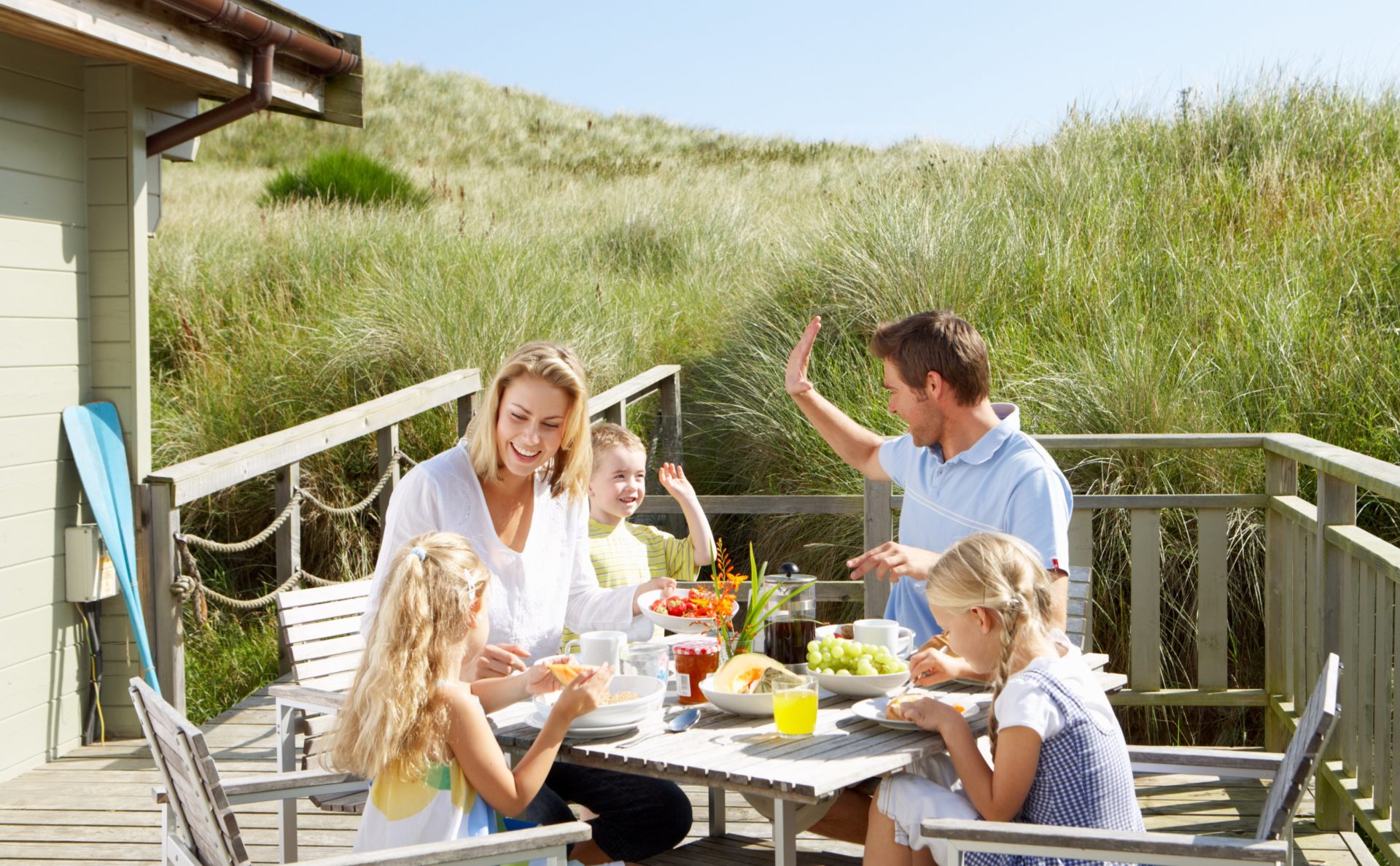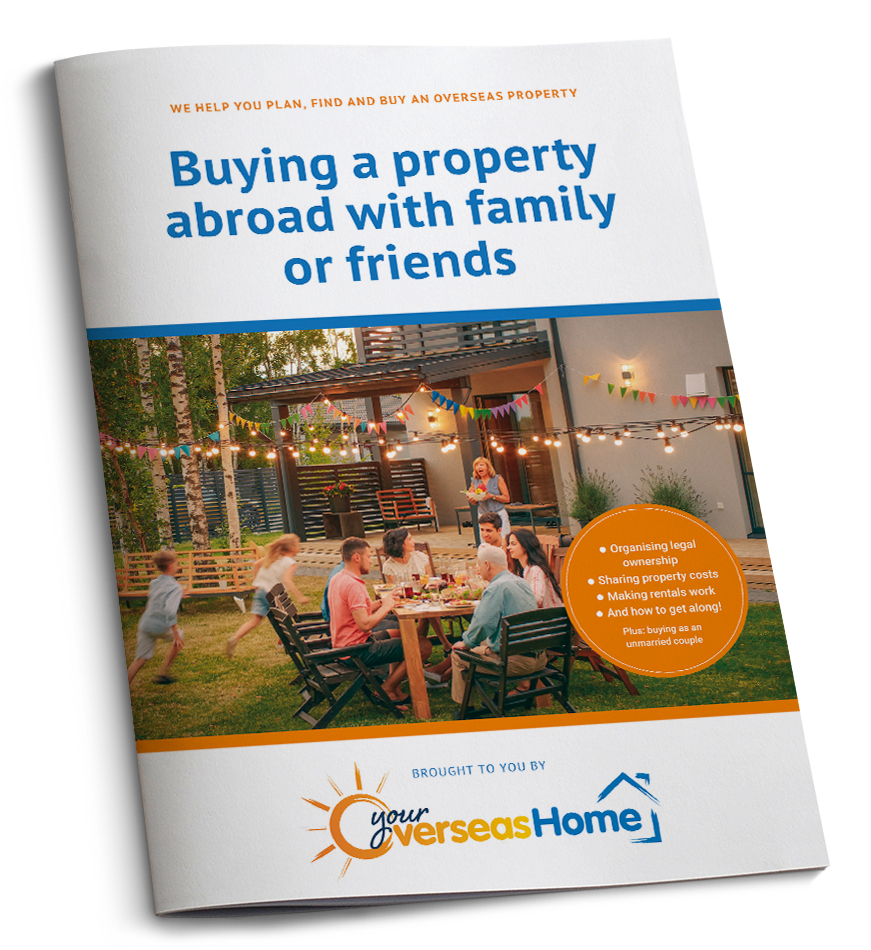A farmhouse with land in the Dordogne, an apartment in a historic Andalusian town, a stylish duplex by the sea in Queensland or a villa and pool in Florida… A holiday home’s a dream come true for many of us. But it can appear far off. Putting up the money for a second home overseas is a big financial investment – and seemingly impossible for a lot of us. However, there is a way: have you considered buying a holiday home with family or friends?
Why buy a holiday home with family or friends?
It’s a fantastic opportunity to pool your family’s resources and enjoy something that might otherwise be out of your reach.
Not convinced? Have a look at our top reasons for buying a holiday home with family or friends.

If you’re buying a holiday home with family, you can make huge savings by pooling your resources.
1. Get double, quadruple or ten times the purchasing power…
Buying a property with a group of people means unbeatable financial savings for each individual. Even just yourself, a sibling, two parents, an aunt and an uncle, two cousins and granddad and grandma together makes the purchasing power of ten people. Suddenly, a €100,000 property costs only €10,000 per person. That maison de maître in the Charente is instantly within your reach.
Buying a property with a group of people means unbeatable financial savings for each individual. With just ten relatives in total, a €100,000 property costs only €10,000 per person.
2. …for half (or quarter, or a tenth) the effort
They say a problem shared is a problem halved. Well, the same goes for buying a holiday home with family. It’s a fantastic way to share out the responsibility for maintenance – or even just the stress of the property search. If you had your own holiday home, you’d be solely responsible for upkeep, even if you didn’t use for half the year. With family, you can divide it out, whether that’s time-wise or by task. In other words, all of you can enjoy a holiday home without having to spend so much time on the upkeep.
3. Bring the family together without the stress
If you’re anything like us, you probably promise at Christmas to see everyone a bit more – and then nothing happens until the next year. If your family’s dispersed around the UK, or working to hectic schedules, a shared holiday home can really help everyone to come together. Firstly, it’s less stressful. If it’s everyone’s home, there’s no one person playing the host. Secondly, it’s much easier to get the kids on board. Teenagers might not be keen on a four-hour drive to spend the weekend at their grandparents’, but no-one’s going to say no to a trip to sunnier climes.
4. Get the most out of the house
Buying a holiday home with family means that the house is much more likely to get used for the majority of the year. Instead of having the home empty for six months, it’ll have a regular stream of visitors – which is great for keeping it ticking over. Not only that, but it’ll probably be welcomed by your community, as they’ll have neighbours year-round, instead of a house shuttered up.
5. Spread wealth around the family
A shared holiday home is a good way for older generations to spread wealth around the family, while still enjoying the benefits themselves. Many younger relatives will be priced out of the property market in the UK, so a family second home will give them an important stake in home ownership in the future.
Make sure that everyone’s finances are protected against risky exchange rate changes. Find out more in our partner Smart Currency Exchange’s Property Buyers’ Guide to Currency
How can we make it a success?
So far, so good. But, as you can imagine, buying a holiday home with family does mean some serious organisation. From maintenance to legalities and usage rights, we look at how to smooth the process of ownership.
1. How do we organise ownership?
Whether you’re buying a holiday home with family or friends, this is something that you must treat as a business transaction. Don’t rely on verbal contracts or good nature – make sure you get everything properly regulated in writing.
For ownership, you have three main options:
- Single ownership: If one person has more capital to contribute and is willing to lead the process, such as a grandparent or parent, then this can make sense. In countries such as Italy, they would purchase the ‘usufruct’ (lifetime right of usage) and siblings would have bare right of ownership.
- Joint ownership: This is where relatives would be joint tenants in common – each with a share of ownership. The shares can be unequal; deeds list specific ownership interests for each co-tenant.
- Company ownership: This means buying as a company, which assigns shares to each relative accordingly. This is most popular in the US, where it can offer protection if someone in the house is injured – and gives a bit more leeway in inheritance.
2. If we need a mortgage, how do we organise it?
If you’re not making an outright cash purchase, but are still looking into buying a holiday home with family or friends, then a joint mortgage could be for you. This will allow several people to contribute together. However, it’s important to consider everyone’s credit rating – one bad score could make it more problematic.
Equally, you need to be sure that everyone will be able to pay on time – and to have a contingency plan of covering the tab if they can’t. Otherwise, it could affect everyone’s future ability to get a loan.
3. What happens when someone inherits?
As touched on above, this depends on the type of ownership and the country concerned.
Unlike the UK, much of Europe follows ‘civil law’, rather than ‘customary law’. This is based on the Napoleonic Code, so can seem quite rigid. In most of these cases, there will be a requirement of ‘enforced heirship’, where property is divided equally between children. For many of these countries, including Spain and France, descendants of the deceased are given priority over their spouse.
In the US, states are split between common law (the majority) and ‘community property’ (California, Arizona, Idaho, Nevada, New Mexico, Texas, Washington and Wisconsin). Common-law states follow the same rules as above, generally speaking. Community-property states mean the spouse must inherit 50% of what the couple has earned together in their lifetime. If not, a written agreement has to be in place.
In most Commonwealth countries, including Australia and New Zealand, you can generally partition the inheritance as you wish.
4. How do we decide on everyone’s tasks and responsibilities?
This can be a tough one, especially if you’re a large group. Firstly, everyone who pitches in needs to be in for the same reason. If some want a home that’ll be with the family for generations and some want one that’ll make money, conflicts will arise.
Everyone who pitches in needs to be in for the same reason. If some want a home that’ll be with the family for generations and some want one that’ll make money, conflicts will arise.
Once you’ve bought the home, the next difficulty is décor. Unless you’ve all got the same taste, it’s best to keep things neutral. A joint bank account helps to share the cost of buying furniture and so on, as well as the maintenance and upkeep.
Set people into working groups to deal with issues, but make sure to match personalities. Avoid mixing up couples for the risk of falling out – all siblings could work better. You’ll need one person to organise the paperwork, too. You could either have one person who’s best suited to it, or rotate each year to avoid anyone being the ‘head’ of the property.
Finally, divide popular times – summer or the Easter holidays – into set blocks. Set up a shared spreadsheet so different blocks can be ‘booked’. Make sure to rotate them each year so that everyone gets to go at different times.

Planning should be part of the fun, but staying on good terms can mean compromise
5. What happens if someone wants to sell up, but we don’t want to?
This can cause difficulty in the plans from the beginning, but there are ways to avoid it. When you first buy, it’s good to draw up an agreement on this. For instance, you could say that no-one will agree to bring an end to the joint ownership by asking for a sale. You could also agree no-one will ask to be bought out in the first five years. Equally, you should make sure that any share is first offered to family members.
If you’re looking into buying a holiday home with family, find all the information you need from the relevant Property Guide. Our in-country experts cover all areas, whether it’s finance, the legalities or settling in. If you’re looking to purchase soon, make sure to book your tickets to the next Your Overseas Home show.


